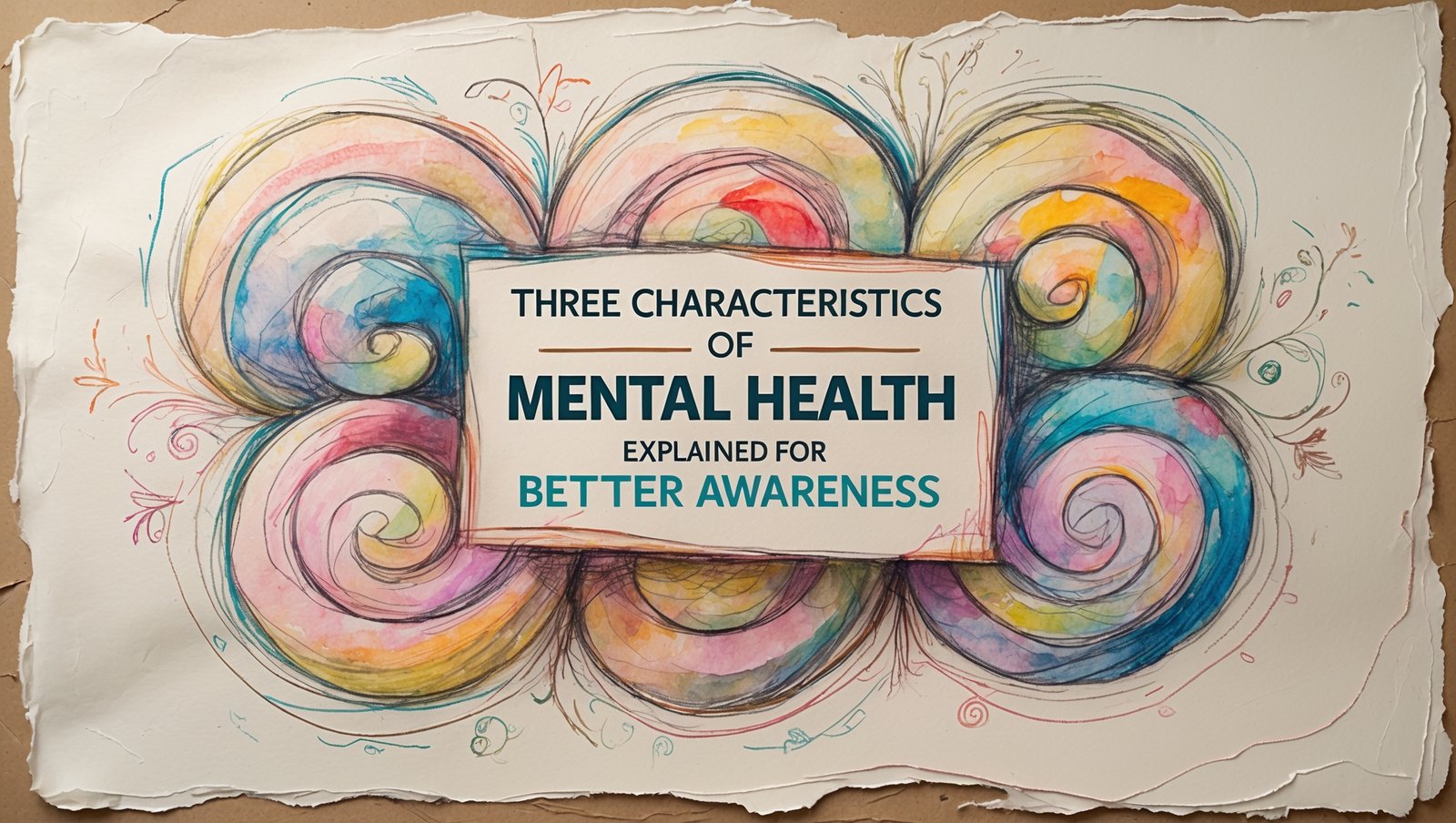Mental health is a crucial aspect of our overall well-being, yet it’s often overlooked or misunderstood. People tend to focus on physical health, but without mental health, it becomes difficult to thrive. Understanding the three characteristics of mental health can help create a more supportive and informed society. This article explores those key characteristics and provides insights into how you can improve and protect your mental health.
Table of Contents
Introduction: Why Mental Health Matters

In today’s fast-paced world, mental health can easily be pushed to the back burner. With constant pressures at work, family demands, and the ever-present digital world, it’s no wonder that many of us neglect our mental well-being. But just like our physical health, our mental health needs care and attention.
So, what does it mean to have good mental health? It’s not just about feeling happy all the time or being free of stress. In fact, mental health is more nuanced and includes the ability to handle life’s challenges, form positive relationships, and maintain emotional balance.
By understanding the three characteristics of mental health, we can take proactive steps to improve our well-being. Let’s explore these characteristics in more detail to help you better understand and nurture your mental health.
What Are the Three Characteristics of Mental Health?
The three primary characteristics of mental health are:
- Emotional Well-being
- Psychological Resilience
- Social Well-being
Each of these characteristics plays an important role in ensuring that you can lead a fulfilling, balanced life. Let’s dive into each one and learn how they shape our overall mental health.
Characteristic 1: Emotional Well-being
Understanding Emotional Health
Emotional well-being is the cornerstone of good mental health. It refers to the ability to recognize, express, and manage your emotions effectively. Emotional well-being is essential because it influences how you experience your daily life and cope with stress.

When you’re emotionally well, you’re able to manage feelings like sadness, anger, and frustration in healthy ways. You understand that emotions are temporary, and you don’t let them dictate your actions. Instead, you choose responses that promote balance and positivity in your life.
Examples of Emotional Well-being
- Self-awareness: Being in tune with your emotions and recognizing when you’re feeling overwhelmed or stressed.
- Self-regulation: Being able to pause and think before reacting to emotional triggers, such as arguments or unexpected changes.
- Optimism: Maintaining a hopeful outlook, even in difficult situations, and trusting that things can improve.
Having emotional well-being means you don’t suppress your feelings; you face them head-on, process them, and move forward in a healthy manner.
Characteristic 2: Psychological Resilience
Building Psychological Resilience
Psychological resilience refers to the ability to bounce back from challenges, setbacks, and difficult experiences. Life isn’t always smooth sailing, and having the resilience to navigate through tough times is essential to maintaining mental health.

People with high resilience can endure hardships like the loss of a job, relationship troubles, or even personal health struggles without allowing these difficulties to negatively affect their long-term well-being. It’s about finding strength in adversity and using challenges as stepping stones for growth.
The Role of Psychological Resilience in Mental Health
Resilience allows you to approach life’s difficulties with a positive mindset and an ability to find solutions. Resilient people are more likely to stay calm, focused, and hopeful in the face of challenges.
Resilience can be developed over time through strategies such as:
- Cognitive reframing: Changing your perspective on stressful situations to view them as opportunities for growth.
- Support systems: Relying on friends, family, or professionals for guidance and encouragement.
- Problem-solving skills: Breaking down challenges into manageable steps, helping you feel in control.
Characteristic 3: Social Well-being
Understanding Social Health and Its Importance
Social well-being refers to the quality of your relationships and your ability to connect with others. Healthy relationships with family, friends, and colleagues are essential for good mental health. Social well-being involves feeling connected, supported, and valued by others.

When you have strong social bonds, you feel less isolated and more secure in your ability to navigate life’s challenges. These connections serve as sources of support, offering both emotional and practical assistance when needed.
Strengthening Your Social Connections
Building and maintaining meaningful relationships takes effort, but the rewards are immense. Engaging in social activities, maintaining communication with loved ones, and seeking out new connections can improve your mental well-being.
Social well-being isn’t just about quantity—it’s about the quality of your relationships. Surround yourself with people who uplift you, encourage your growth, and provide positive influences in your life.
The Impact of Relationships on Mental Health
Healthy relationships are more than just enjoyable—they directly contribute to better mental health. People with strong social support systems are less likely to suffer from mental health problems like depression or anxiety. They also tend to live longer, happier lives.
Having a reliable support system means you have a network to turn to during stressful times. Whether it’s a family member, a close friend, or a therapist, knowing that there are people who care about you can provide immense relief.
How These Characteristics Work Together
When you cultivate emotional well-being, resilience, and social well-being, you create a strong foundation for mental health. These characteristics are interconnected. For example, a positive social environment can strengthen your emotional health, while resilience helps you cope with social challenges. Together, they form a comprehensive approach to mental well-being.
Practical Tips to Improve Your Mental Health
- Practice mindfulness: Engage in activities like meditation or deep breathing to enhance emotional regulation.
- Build your resilience: Challenge yourself with new experiences and learn from setbacks.
- Nurture relationships: Spend quality time with family and friends and build a supportive community.
Conclusion: Embracing Mental Health Awareness
Mental health is an essential part of your overall well-being, and understanding the three characteristics of mental health can help you nurture it more effectively. By focusing on emotional well-being, resilience, and social health, you can improve your mental health and live a more balanced, fulfilling life.

Don’t wait for a crisis to prioritize your mental health—take steps now to ensure that you’re maintaining a healthy mind. Remember, mental health is just as important as physical health!
FAQs
- What are the three characteristics of mental health? The three characteristics of mental health are emotional well-being, psychological resilience, and social well-being.
- How can I improve my emotional well-being? You can improve emotional well-being by practicing self-awareness, self-regulation, and maintaining an optimistic outlook on life.
- Why is psychological resilience important? Psychological resilience helps you recover from challenges and setbacks, promoting mental strength and the ability to handle life’s difficulties.
- What role do social connections play in mental health? Social connections provide emotional support and reduce feelings of isolation, helping to improve overall mental well-being.
- Can improving these characteristics help with anxiety and depression? Yes, improving emotional well-being, resilience, and social connections can significantly help manage and reduce symptoms of anxiety and depression.





